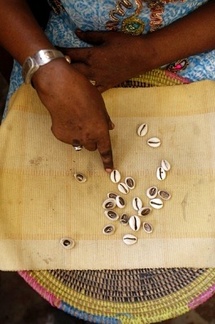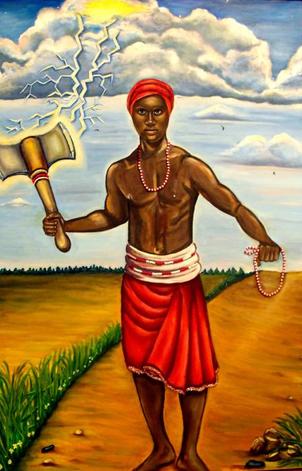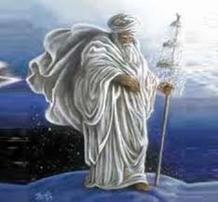 Story telling is a way to share knowledge
Story telling is a way to share knowledge One of the ways we pass along knowledge of the Lucumi religion is by telling stories or recounting myths that are part of an oral heritage. These stories are called patakís. We don't recognize any particular person as the author or creator of a patakí because we don't know the exact origin of the stories, how or when they came into being. But we do know that they are old stories, having roots in west Africa and brought to Cuba via the slave trade in the 19th century. Unlike the Bible or other written religious texts, there is no single authoritative version of the patakís. Lucumí practitioners learn patakís from their elders. Over time, generations of storytellers have modified and embellished details, creating folk tales that reflect the imagination and creativity of the people who tell the stories. Because patakis existed primarily in oral form, the act of learning and reciting them depended on the memory and skill of the person speaking. For this reason, people today may know different versions of the same patakí. Despite small differences in the telling, however, the overall message or "moral" of the story remains the same. A patakí, in its most basic form, isn't a work of literature or fiction. It's a religious text, and it exists to teach us a lesson about our world.
Patakís are Used in Divination
 An odu is determined by the way the shells fall on the mat
An odu is determined by the way the shells fall on the mat Diviners use patakís, along with proverbs or refranes, to deliver a message to the person who has come for a reading. For example, if the odu Obara appears when the shells are thrown, the diviner knows that the client has a problem related to speech, the way he uses his tongue. Either he talks too much, or people are talking about him. Or, his words are misunderstood. There is also a problem with lying. People may act one way to his face and speak badly about him behind his back. While the diviner could deliver the message in just this way, a more traditional approach is to begin by reciting a proverb or telling a story (a patakí). The diviner has to study in order to know which proverbs and patakís belong to each odu, and how to apply them to the client's situation. To begin the reading with a story draws the client into the conversation and requires him to do some critical thinking, not just absorb the information passively. He listens to the patakí and then the diviner asks him to reflect on how this story might apply to his situation. If the client can understand the patakí and its importance in his life at that moment in time, the client will understand on a more profound level the nature of his problem.
Changó Learns about the Importance of the Tongue
 Changó has a fiery nature and is often the subject of gossip and intrigue because others envy him
Changó has a fiery nature and is often the subject of gossip and intrigue because others envy him Here is an example of how a patakí from Obara might sound when delivered by a diviner:
When Obatalá put Changó in charge off governing people, Changó was very young. No one respected him or took him seriously, so of course they never obeyed him. Every day somebody from the village went to Obatalá to complain about Changó as a way to make Changó look bad. Obatalá called Changó and spoke very bluntly to him, because Obatalá has never been one to beat around the bush. There were so many bits of gossip and malicious stories about Changó that one day Changó went to Obatalá and asked him: "Papá, why do people tell so many stories about me? Every day they say something different, and none of it is true!" But Obatalá knew that Changó was very hardworking and smart, and that he took his responsibilities seriously. He told him: "My son, I want you to prepare a dinner for me and all of my children. I want you to make the most delicious food you can imagine." So, Changó prepared a feast for Obatalá and all his children, just as Obatalá had requested. He served them beef tongue as the main dish. Obatalá asked him: "Changó, is tongue the best food in the world?" Changó answered: "Yes, papá, it is full of ashé, the best in the world." After some time went by, Obatalá asked Changó to prepare another feast for him and all his children. But this time, he instructed him to serve the worst food in the world. Changó once again prepared beef tongue, and Obatalá asked him: "Changó, son, if the last time you prepared the same thing and you said it was the best food in the world, why are you now serving tongue and telling me is the worst thing in the world?" Changó replied: "Naturally, papá, a good tongue can save a village and a bad tongue can destroy it." Obatalá said to him: "You're right, Changó. That's where you were born, in Obara Melli, and that's why you find everyone is always talking about you all the time. It doesn't matter what they say, good or bad, because whatever they say about you will make you great. Only on the day they stop talking about you will you cease to be Changó."
When Obatalá put Changó in charge off governing people, Changó was very young. No one respected him or took him seriously, so of course they never obeyed him. Every day somebody from the village went to Obatalá to complain about Changó as a way to make Changó look bad. Obatalá called Changó and spoke very bluntly to him, because Obatalá has never been one to beat around the bush. There were so many bits of gossip and malicious stories about Changó that one day Changó went to Obatalá and asked him: "Papá, why do people tell so many stories about me? Every day they say something different, and none of it is true!" But Obatalá knew that Changó was very hardworking and smart, and that he took his responsibilities seriously. He told him: "My son, I want you to prepare a dinner for me and all of my children. I want you to make the most delicious food you can imagine." So, Changó prepared a feast for Obatalá and all his children, just as Obatalá had requested. He served them beef tongue as the main dish. Obatalá asked him: "Changó, is tongue the best food in the world?" Changó answered: "Yes, papá, it is full of ashé, the best in the world." After some time went by, Obatalá asked Changó to prepare another feast for him and all his children. But this time, he instructed him to serve the worst food in the world. Changó once again prepared beef tongue, and Obatalá asked him: "Changó, son, if the last time you prepared the same thing and you said it was the best food in the world, why are you now serving tongue and telling me is the worst thing in the world?" Changó replied: "Naturally, papá, a good tongue can save a village and a bad tongue can destroy it." Obatalá said to him: "You're right, Changó. That's where you were born, in Obara Melli, and that's why you find everyone is always talking about you all the time. It doesn't matter what they say, good or bad, because whatever they say about you will make you great. Only on the day they stop talking about you will you cease to be Changó."
How to Interpret a Patakí
 Obatalá inspires patience and wisdom
Obatalá inspires patience and wisdom Once the information has been delivered in the form of a patakí, the diviner will probably ask the client to reflect on how it relates to his own life. Depending on the circumstances of the client, he may identify with Changó, Obatalá, or even with the villagers who are gossiping about Changó. The mention of the tongue is obviously meant as a metaphor, as a warning about the way human beings like to gossip. They can use their words to build someone up, or to tear someone down. How we react to the gossip is also important. If we're worried about what others say, we can become paralyzed and unsure of ourselves. But if we understand that sometimes people talk about us because they're envious of us, or they realize we're born leaders and resent that they aren't the same, then we can let their words roll off of us and not hurt us. What political leader hasn't had critics? Changó can be a hothead and react with anger to any imagined slight, but Obatalá, who is older and wiser, always advises a more intelligent approach. When he tells Changó to prepare a meal, he encourages critical thought in Changó. He wants the younger man to reflect on the dual nature of words and communication. It's important that Changó have a chance to figure out the problem for himself, in a calm and measured way. If he's going to be a leader, he has to rise above his enemies. He can't slander them and start a war with them. In the long run, Changó's greatness depends on his ability to distance himself from the talk about him, and use his position in the public eye to achieve greatness. As long as people are talking about him, it means he's doing his job, showing his leadership skills. A leader can't hope to please everyone.
The patakí also helps people understand the nature of the orishas and their relationship to each other. Through the telling of patakís, Lucumí practitioners learn the life stories of the orishas, when they walked the earth in human form and experienced many of the same situations that humans face today.
There are multiple patakís associated with each odu, and it's the job of the diviner to know which one is most applicable in the case of the person who's come for a reading. A godparent might also tell patakís to godchildren as a way to advise them about their behavior and conduct, or simply as a way to pass on knowledge about the religion.
Today, with the breakdown of traditional communities, there are many Lucumí practitioners who don't know patakís. To address this problem, some writers have started to collect and publish patakís on the internet and in book form. Remember, if you find these in your research, they are just one version of how the patakís might be told. In order to understand them on a deeper level and know how to apply them to situations in life, it's still very important to talk with your elders about them, and ask them to share their thoughts with you. The oral tradition creates bonds between people, and storytelling is an important part of Lucumí culture, even in the 21st century.
There are multiple patakís associated with each odu, and it's the job of the diviner to know which one is most applicable in the case of the person who's come for a reading. A godparent might also tell patakís to godchildren as a way to advise them about their behavior and conduct, or simply as a way to pass on knowledge about the religion.
Today, with the breakdown of traditional communities, there are many Lucumí practitioners who don't know patakís. To address this problem, some writers have started to collect and publish patakís on the internet and in book form. Remember, if you find these in your research, they are just one version of how the patakís might be told. In order to understand them on a deeper level and know how to apply them to situations in life, it's still very important to talk with your elders about them, and ask them to share their thoughts with you. The oral tradition creates bonds between people, and storytelling is an important part of Lucumí culture, even in the 21st century.
 RSS Feed
RSS Feed
